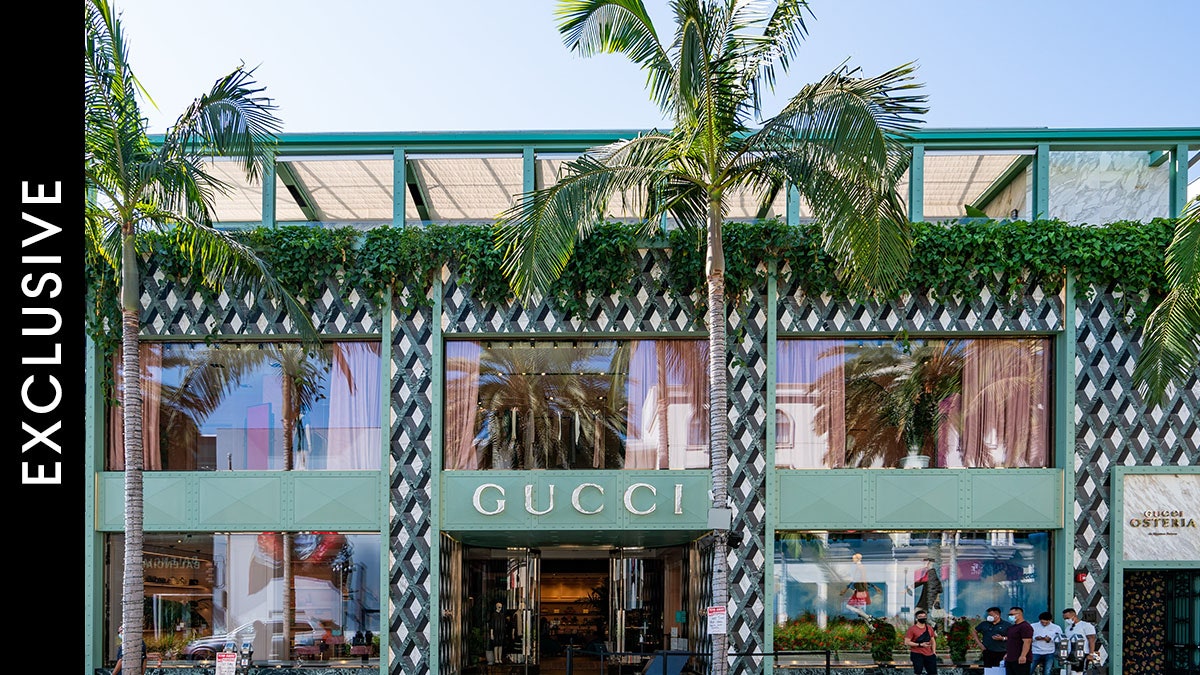Follow us
Sign up to our newsletter for a truly global perspective on the fashion industry
Enter your email to stay updated with newsletters, event invites & promotions via email from Vogue Business. You can unsubscribe at any time. Please see our privacy policy for more information.
To become a Vogue Business Member and receive the Technology Edit newsletter, click here.
Gucci is tapping into the crypto crowd. The brand will accept cryptocurrency payments in some US stores at the end of this month, and plans to extend the pilot to all of its directly operated North America stores this summer. The move marks a major validation for the currency from a leading luxury brand.
In-store crypto payments will be made with a link sent via email to the customer; the link contains a QR code that allows them to execute the payment from their crypto wallet. The first Gucci stores to take crypto are Wooster Street in New York, Rodeo Drive in Los Angeles, Miami Design District, Phipps Plaza in Atlanta and The Shops at Crystals in Las Vegas. Gucci will accept payments in more than 10 currencies, including Bitcoin, Bitcoin Cash, Ethereum, Wrapped Bitcoin, Litecoin, Shiba Inu and five stablecoins pegged to the US dollar. It will also accept Dogecoin, a “meme” cryptocurrency originally created as a joke.
Crypto payments are usually accepted in physical spaces through a QR code or NFC reader on an existing point of sale terminal that connects with a customer’s smartphone cryptocurrency app, similar to mobile credit card payments. A retailer can automatically convert the payment to fiat currency, such as US dollars, or keep the payments in the form of cryptocurrency.
At more than 100 years old, Gucci has set a precedent for the unexpected. Now, that reputation is manifesting in a robust metaverse strategy that signals a long-term investment in virtual worlds and digital clothing.
Brands have been increasingly testing blockchain technologies, primarily through NFT artwork collections and digital twins that store product information, but in-store crypto payments are still nascent. Gucci has established itself as an early adopter of Web3 technologies, which include blockchain, and crypto payments mark another step toward Gucci blending its existing physical presence with its emerging Web3 efforts.
Most recently, it shared via its Gucci Vault Discord server that owners of two of its NFT projects — SuperGucci and Gucci Grail — would have special access to pre-order a Gucci collection before it is released to the general public. It’s a move that clearly ties NFT collections and Gucci’s budding Web3 community to real-world consumption — a significant move for a luxury brand.
“Gucci is always looking to embrace new technologies when they can provide an enhanced experience for our customers,” said Marco Bizzarri, Gucci president and CEO, in a statement. “Now that we are able to integrate cryptocurrencies within our payment system, it is a natural evolution for those customers who would like to have this option available to them.”
A handful of other luxury retailers have started testing out crypto payments. In March, Off-White announced that flagship stores in Paris, London and Milan had begun accepting payments including Bitcoin, Ethereum, Binance Coin, Ripple, and stablecoins Tether and USD Coin. It processes transactions using a terminal that finds the best crypto-to-fiat exchange rate at the time of transaction, and scans a QR code that is provided by the customer’s payment app. It does not have payment limits, but only offers refunds as store credit in local currency. This is in part due to the relative volatility in the value of various cryptocurrencies. Gucci plans to offer returns for cryptocurrency purchases in cryptocurrency.
Philipp Plein is in the process of building out a London store that, in addition to accepting crypto payments, has an NFT gallery and offers people the option to upgrade certain purchases with a corresponding digital Decentraland wearable NFT. In February, Plein told Vogue Business that his brand completes at least one crypto transaction per day and has already amassed 150 bitcoin (equal to approximately $5.8 million at the time of writing) in revenue.
Offering in-store payments via cryptocurrency requires some upskilling for in-store associates, especially as NFT collectors come to expect special perks of ownership, including access to specific product drops or access to specific spaces.
To that end, Gucci parent company Kering has this week introduced an in-house game, developed in collaboration with creative agency Al Dente, that educates employees on NFTs and Web3. Already, the number of employees who have signed up have exceeded expectations, according to a spokesperson.
Gucci has recently built out a Web3-focused team, and has purchased and is developing digital real estate on The Sandbox, a blockchain-based real estate platform in which Adidas and Al Dente, among others, are also developing land. Gucci was the first luxury brand to release an NFT; the one-of-one art film sold for $25,000 in June. Since then, it has released two other NFT projects and opened a Discord server, in addition to its Sandbox investment.
Comments, questions or feedback? Email us at feedback@voguebusiness.com.
More on this topic:
Gucci CEO Bizzarri talks metaverse strategy and why it’s “already a very real place for us”
Want to spend your crypto on fashion? Off-White now accepts it
What are Gen Z investors wearing?
Sign up to our newsletter for a truly global perspective on the fashion industry
Enter your email to stay updated with newsletters, event invites & promotions via email from Vogue Business. You can unsubscribe at any time. Please see our privacy policy for more information.
© 2022 Condé Nast


